Do Rules on Disturbing Lead Paint Apply to a Detached Garage?
In federal rules that took effect last April, contractors who disturb lead paint in homes built before 1978 must be certified, and they must adhere to certain work practices designed to prevent the spread of lead dust and chips.
The U.S. Department of Environmental Protection offers a detailed explanation of the so-called RRP rules (for renovation, repair and painting) on its web site. The issue also has been covered at both Fine Homebuilding and Green Building Advisor.
But exactly how the regulations are to be applied is not always perfectly clear.
That’s the case in this Breaktime post by Bryan Klakamp. Bryan writes that a neighbor hired someone to clean and paint an old, detached garage on is property.
“He used a high pressure sprayer to blow the paint off of the garage, and he used no tarps, so paint chips are everywhere,” Bryan writes.
“The neighbors garage is less than 20 feet from my house, and we will end up tracking lead paint chips into our house. My question is: Does the RRP Rule apply to garages and other outbuildings? Is there a minimum distance away from a residence?
The instructor at Bryan’s RRP class said barns were excluded from the rules, but wasn’t specific about detached garages. What’s the deal?
RELATED ARTICLES
Lead Paint Law Claims First Contractor
Lead Paint: The Fines are Real
Lead Based Paint and Green Remodeling
Rules are long and complex
Some of the replies suggest that if the intent of the regulations is to prevent lead contamination of areas where people work and live, it would make sense to include a detached garage.
“You can bet if it doesn’t cover it, it sure as hell should,” Calvin writes. “That is if the direction of the laws are toward real protection of inhabitants of dwellings and to those neighbors surrounding said dwelling.”
“If that happened in RI, one phone call to the state would have an enforcement officer there in 15 minutes,” MikeSmith adds.
Yet tracking down this nuance could be a formidable job. Zipwall provides a link to the EPA rules as explained in the Federal Register in 2008. The answer to Bryan’s question may be here somewhere, but the document is 79 pages of dense text that looks like something out of a textbook for third-year law students.
Piffin, in fact, attempted a keyword search of the document, hunting for “garage,” “detached,” and “separate,” and came up empty.
In the absence of any definite ruling, DanH doesn’t think the exclusion for barns would apply here. “My gut feel is that the exemption for barns is a general exemption for ‘agricultural buildings,’” he writes. “Ag buildings are routinely exempted from many building and safety regs for several reasons, good and bad. A garage would only earn an exemption if you kept a horse in it.”
Other complications
Renosteinke says the answer to Bryan’s question hinges on two points: not only whether a detached garage would be considered part of a residence, but also whether the person doing the work was a “contractor” under the regulations.
Suppose the worker was paid less than $600, therefore falling below the IRS threshold for a 1099 tax form, and didn’t advertise his services with a business card, an ad on Craigslist or something similar.
In that case, Renosteinke says, “the guy can probably claim to be an employee, and thus exempt from the rules.”
“The fact is, your neighbor can sand/scrape/power-wash his house all day, sending lead paint dust flying all over the neighborhood, without violating the law,” Renosteinke writes. “It’s only illegal if a CONTRACTOR does the same thing. So, have a hissy fit if it makes you feel better … but that’s the only satisfaction you’ll get.
“There’s another unintended consequence: the new rules will only give the itinerant laborer an even greater price advantage over a ‘real’ contractor. At some point, all that will remain are the trunk-slammers. Most folks feel that being a ‘good neighbor’ stops at their pocketbook.”
Our expert’s opinion
Martin Holladay, senior editor at Green Building Advisor — and author of the whitepaper, A Contractor’s Guide to the New Lead Paint Rule, had this to say:
The EPA regulations, called the Renovation, Repair, and Remodeling (RRP) Rule, apply only to housing. According to the RRP Rule, “‘Target housing’ is defined in section 401 of TSCA as any housing constructed prior to 1978, except housing for the elderly or persons with disabilities (unless any child under age 6 resides or is expected to reside in such housing) or any 0-bedroom dwelling.”
Most experts interpret this to mean that the RRP Rule does not apply to detached
garages. For example, a Web site maintained by the state of Oregon includes the following Q&A: “Q. For a detached structure not used as a dwelling (for example, a garage, shed, barn, boathouse) do the LBP rules apply? A. No. The building is not housing. Therefore, it is not ‘target housing’ even if built before 1978.”
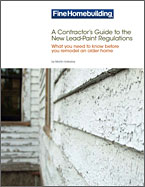 |
Download Martin’s white paper in our Lead Paint Remodeling Center. Also,watch videos on complying with the RRP rule both indoors and out, download special checklists, and a job site sign that you can post on jobs. |
Fine Homebuilding Recommended Products
Fine Homebuilding receives a commission for items purchased through links on this site, including Amazon Associates and other affiliate advertising programs.

Reliable Crimp Connectors

8067 All-Weather Flashing Tape

Handy Heat Gun
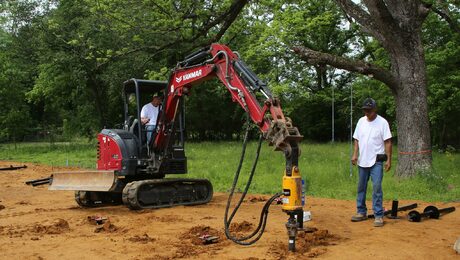

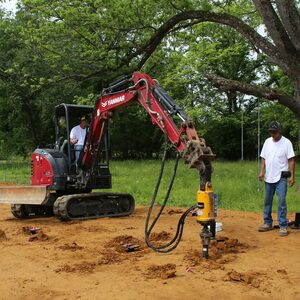
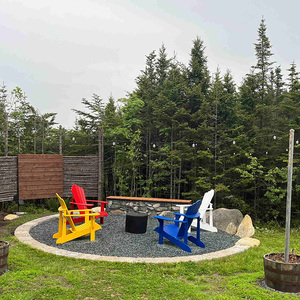
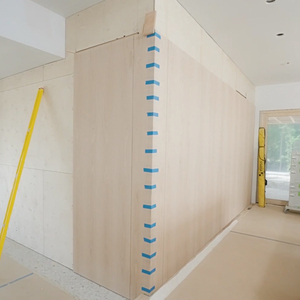


















View Comments
Dear Mr. Gibson,
Although you wrote an interesting and provocative article, I strongly disagree with you and your expert’s opinion as it fails to take into account what this activity may do to the play area of a child. I suspect that you are not looking at the bigger picture which is that unless “we” (Certified Renovators) can somehow prove that a child will not spend any significant time in and around the renovated area, we are not allowed to engage in activities which release lead and contaminate the area. If we ignore this or try to get around it, we are perpetuating the notion that ethics are irrelevant and we subject ourselves to having violated the federal rules while exposing ourselves to huge fines.
Unless the rules define something as being excluded… it’s not! For you to suggest that its open to interpretation is not helpful.
Sincerely,
Henry
Henry Thomas Ltd.
MN general contractor
40 CFR Part 745 Lead; Renovation, Repair, and Painting Program;
“a child-occupied facility is a building, or a portion of a building, constructed prior to 1978, visited regularly by the same child, under 6 years of age, on at least two different days within any week (Sunday through Saturday period), provided that each day’s visit lasts at least 3 hours and the combined weekly visits last at least 6 hours, and the combined annual visits last at least 60 hours.”
The reality is that the rules define what is excluded.
• Housing built in 1978 or later.
• Housing for elderly or disabled persons, unless children under 6 reside or are expected to reside there.
• Zero-bedroom dwellings (studio apartments, dormitories, etc.).
• Housing or components declared lead-free by a certified inspector or risk assessor.
• Minor repair and maintenance activities that disturb 6 square feet or less of paint per room inside, or 20 square feet or less on the exterior of a home or building.
• Note: minor repair and maintenance activities do not include window replacement and projects involving demolition or prohibited practices.
What's wrong with some simple logic instead? It's all well and good that there are laws regarding the removal of lead paint -- but those are just the laws, not necessarily any common sense. You can argue about the law but reality isn't much interested in that train of action.
For instance: If those lead chips fall onto the ground and are left there, 1) do they pose a threat to drinking water; 2) do they pose a threat to growing plants intended for eating; 3) do they pose a threat to children playing about in them; 4) what happens when the homeowner goes over them with a rotary mower? I suspect that fancy mulching mower does an efficient job of converting them to breathable dust. Ain't that just peachy?! (but legal)
Seems to me that we owe it to ourselves, our posterity and our environment to go to some effort to collect those lead chips and dispose of them properly regardless of the 'laws'. That's not asking too much for our future health now is it? If you think it is .... check back in a couple of decades with us, OK? You may be feeling a good bit different then.
More Regulations & Government Control Promoted by FHB
The new federal rules pertaining to lead based paint are asinine. That's right I said it - asinine.
And the whole Fine Home Building ("FHB") article not only supports the stupid federal lead paint regulations, it suggests that they are not stringent enough! That's nuts! Laws like like this (and countless others) hurt contractors and taxpayers (while proponents of big, bloated, inefficient government love this nonsense). Instead of giving tacit support to ever increasing government regulations, and infringements on our freedoms, FHB should be attacking these very costly (and ineffective) laws.
These sort of laws are not only extremely costly and inefficient, they always lead to waste, fraud and abuse by the masterminds who are hell bent on running ever aspect of the lives of us ignorant, little people. Sure, most of these masterminds are well-meaning, but they are no smarter than we are. In fact, I think they are largely more ignorant than us suckers in the private sector as most of them couldn't cut it in the "real world."
Like the vast majority of government rules and regulations, these laws and regulations come at a very steep cost. E.g., increases in building costs, which reduces the demand for housing as less people can afford these increased costs (this directly hurts the construction industry). Plus, there are huge costs to taxpayers who must pay for the big salaries, benefits, and pensions of the government beauracrats (who earn double what the ave public worker makes).
It's beyond me why we allow these already massive government agencies, like the EPA, to get bigger & bigger, while they rule more and more aspects of our lives.
And for what? The neighbor in the story couldn't have been exposed to any lead paint unless she got on her hands and knees and lapped up the paint chips. And, in all likelihood, there wasn't any lead in the paint anyway.
I know some big govt lib is going to say, "hey, but what if those paint chips that were carried into the house were eaten by the owner's 2 year old?" Just clean it up first! What if it were dog crap? Same thing, clean it up! And if the dog crap is from your neighbor's dog, politely ask your neighbor to clean up after their dog.
Think about it, the person complaining in the article was worried that a few paint chip would be tracked into her house. Why not simply ask the barn owner to clean it up? That's what a good neighbor would do. But this jerk instead wants to immediately call the authorities. Then perhaps her lawyer. We all know clowns like this.
Also, the author of the article suggests that the "unintended consequences" of the law is that it was not so expansive as to cover barns. That's ridiculous and it perfectly displays the ignorance of both the author and FHB's editor (for allowing such garbage to be posted on it's website). I discussed the true unintended consequences above.
Hey, why not have government take over the construction industry? Oh that's right, these liberal jackasses don't like getting dirty or hard, physical labor. So they do the next best thing - regulate the hell out of it.
Finally, I believe that FHB profits by the imposition of government regulations like this stupid lead paint law. Instead, FHB should be fighting against the ever increasing nanny state and the ever expanding intrusion of government (local, state, & federal) in our lives. The construction industry has its foundation in hard work, self-reliance, & independence. Bad contractors will be weeded out by the market.
Free markets, not government, is the answer.
Wise up FHB.
ucla_alum_88,
If you want to criticize the EPA, I would not target the recent LEAD removal rules, but rather ask why they took them nearly 25 years longer than most of Europe did to get these paints off the market? The entire scope of the issue is much larger because we were still using the stuff long after is was known to be a dangerous problem.
How many people have heard of children that have been affected by lead poison. I have taken the class and I can tell you that the cost to remodel their way over the conventional way will be a great deal more than just 10% and some of it such as wrapping every piece of lumber that comes from a job site is ridiculous. I don't think it is economically possible and who does this hurt? Middle class Americans that now can not afford the price to remodel their home and must either stay in what you say is a dangerously lead contaminated home or wait until they can move to a newer home because of the financial bind trying to sell a pre-1978 home will become. This law will result in damage to an owners private property and if this law stands then the government should reimburse the owners for the economic result. Contractors that have worked on these homes for decades without problems will either face fines or try to absorb the cost in a market that is already soft. Who benefits? I would think trial lawyers will be at the head of the list. The lack of any consultation with our industry or balance with the threat involved is just another example of big government and the trial lawyers they represent using children as the reason to encroach on our livelihoods.
I would say that if either adults or children spent any time in or near the garage, lead paint should be removed professionally.
To the person who claims that he has never seen lead damage somebody's IQ, I would like to point him to this paper..
http://www.ncbi.nlm.nih.gov/pmc/articles/PMC3155319/?tool=pubmed
You can download a free PDF of it here:http://www.ncbi.nlm.nih.gov/pmc/articles/PMC3155319/pdf/ijerph-08-02593.pdf
Read it, it gives a very good picture of the total health picture of what lead does to people of all ages.
Its not a pretty picture.
Lead and mercury, right there, are responsible for a great many of our health problems here in the US, especially in the poor.
Irrespective of the LBP rules: Remember that OSHA has seperate lead paint rules that protect workers.
And, they can be far mor eonerous. Periodic blood testing, full respiration gear, and a test for each job site to determine the level of hazard.
The article offers speculation and debate, unfortunately is doesn't offer any clear guidance on whether the garage falls under the RRP rule. The rule is confusing and often unclear, I agree. However, a quick and simple search of the FAQ page of the EPA website typically provides a clear answer.
Yes, the garage falls under the rules. This link will bring you to EPA's answer:
http://toxics.supportportal.com/ics/support/KBAnswer.asp?questionID=31782&hitOffset=6&docID=1096
For accurate and contractor friendly interpretations of the RRP rule you can visit http://www.RRPedia.com
Shawn McCadden
http://www.shawnmccadden.com
We stand corrected.
After this was first published, we learned of an advisory from the EPA that addresses this question directly. It suggests that a garage, as well as other outbuildings on urban and suburban lots, are indeed covered by the rules.
Shawn McCadden was first to point this out in his comments above. He also includes the link to the EPA's comments.
Thanks for the heads up, Shawn.